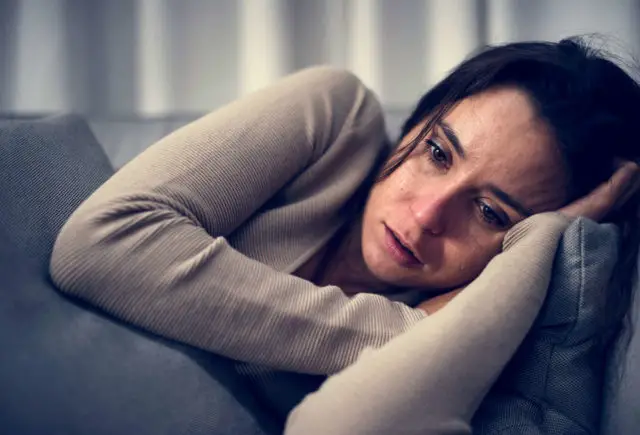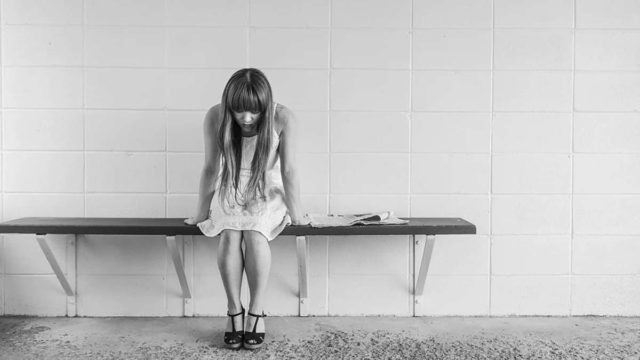It is assumed that the arrival of an expected pregnancy is always news that fills not only parents but also family and friends with joy. However, it is not always so.
There are women for whom waiting for a child is a storm full of anxiety, stress and complete sleepless nights thinking that they are not in a position to face motherhood. To the doubts in his head are added the stigma and misunderstanding of the environment.
According to the Mayo Clinic in the US, research suggests that about 7% of pregnant women experience depression during those 9 months. And it’s thought rates could be higher in low- and middle-income countries. Experts say that at the same time, the mother is exposed to a higher risk of suffering from postpartum depression and experiencing difficulties in establishing emotional ties with the baby.
The day we spoke with Cecilia García Prieto, who lives in Spain, her daughter, Luna de Ella, was a few weeks away from being born. How can you not be happy being a future mother?, they asked her over and over again. But she was not happy.
Cecilia tells the story of the 9 months she spent fighting against negative thoughts of all kinds, against the stigma of depression and against an environment that did not understand how her pregnancy did not make her crazy with joy.
It all started when I caught Covid-19 on December 24th, 2021, while she was 8 weeks pregnant. She had returned to Argentina to visit my family and when I tested positive, I immediately isolated myself. I was 7 days without seeing my family, alone and scared.
Obviously I talked to Adrián [the father] every day, but she was completely alone and I was very afraid that something would happen to the baby. At that time the pregnancy was very early, that is, it was only nine weeks old, when the risk of miscarriage was very high. And I think it was during those days that I most started to think about all the bad things that could happen.
When I returned to Spain in January, we had a consultation to carry out a genetic test that ruled out some serious illnesses in the baby. I lived through those weeks with a lot of worry, but I did not feel like I was depressed. I felt that it was like an anguish like a very deep sadness and a terrible fear of having an abortion. With that DNA test we learned that she was a girl and that everything was correct.
Covid-19 left me with physical consequences, but the baby was fine. However, despite the fact that everything was in order and that the 12th week had already passed, when the risk of miscarriage decreases a lot, I was not calmer; the worst was over, but I did not recover mentally.
And that is where I started thinking that things in my head were not working right. It had been many days since I wanted to get up. He slept for many hours. I thought it had to do with the pregnancy. The first few months you tend to sleep more than at other times because you are more tired.
I attributed what was happening to me to the pregnancy and yet inside my head I had a number of negative thoughts that I did not know where they came from or why this was happening to me. I thought it was a disaster that I was not going to be able to do it.
I am even ashamed to say it… But I have even come to think that I would better give her up for adoption, so that someone better than me could take care of this baby. I do not know how to explain it, because you feel ungrateful for the situation you live in.
I am super grateful for the opportunity that God gave me and for everything. But well, my head reacted in a different way. I thought: “what the hell did I get myself into?”, “I do not know if I am going to be able to handle this”. “I’m going to be a disgusting mother. I am not going to be able to take care of this baby”. “Poor thing, she doesn’t deserve a life like this. What kind of mother am I going to be? Maybe it would be better if she had someone else. How did I get into this mess?”.
My head was full of negative thoughts like that. I honestly did not feel capable of coping with motherhood. I did not realize that I was actually suffering from pregnancy depression until about week 15. My doctor told me “you have to stay calm, things are going well”, but I could not.
I felt like shit. I am not going to lie. Every day it was a huge effort to get up in the morning. I am over 40 years old and have always been told that my eggs were of poor quality. That there was very little chance of her getting pregnant, and if she did, there was also a very high chance of miscarrying or not carrying it to term.
She lived in anguish thinking that she was going to lose the baby at any moment. So I got to pass Covid-19 in the first weeks of pregnancy, knowing that my eggs are of poor quality and a lot of worries on top. I think it was the conjunction of many things.
I was sad but I didn’t know it was depression. All this time I felt very bombarded on the outside. People do not fully understand what depression is in pregnancy. I say this from my own experience. They tell me: “Oh! But you have to be very happy.” And I answer yes, I’m super happy, but my thoughts go elsewhere. After that, I understood that my surroundings did not understand what I was going through.
I know it’s a complete subject and one feels very judged. That happened to me. It’s a super-taboo subject that you can’t talk about openly. That led me to isolate myself. It’s the best I could do.
I had a hard time taking care of myself and that made it difficult for me to relate to the outside world.
Luna was born on July 14th and Cecilia is feeling better
During the pregnancy, I noticed that I couldn’t bond very much with the baby. It wasn’t until the last three weeks that I started shopping for the crib and things. I spent almost 8 months, I’m not telling you denying the pregnancy because it was there and it was becoming evident, but let’s say I didn’t give it all my attention. And today I feel terrible about it, because I didn’t know how to take advantage of it; I didn’t know how to see it. I didn’t know how to enjoy it.
But it was impossible for me. My body and my head prevented me. No matter how hard he tried. Now I look back and say to myself, “How could I have thought all those things?” I hold her in my arms and I am amazed at how pretty she is. I don’t know how to explain it, I see her and I say “My God, how could I not see it at that time?”.
It is something that I will have to carry the rest of my life because it is unfortunate that this has happened to me. Now I truly value the gift I have.
Cecilia and her newborn daughter Luna
What can mothers who are going through the same thing do? “Depression and anxiety are often misdiagnosed. It is important to seek professional help, especially talk therapy”,MareikeSuesse, a clinical psychologist specializing in mental health in pregnancy and the postnatal period, explains to BBC Mundo.

For the specialist there are many underlying reasons why depression can develop during pregnancy, and it is important to address these root causes, rather than just using medication. “A useful tool to try is a “pleasure and achievement journal”. Try to include every day one activity that gives you pleasure and one activity that gives you a sense of accomplishment,” she adds. “They don’t need to be big tasks —it’s important to give yourself credit for small victories, like doing the dishes”.
“Pregnant women with depression need to adjust their expectations: It is okay not to function at the same level as before pregnancy. It is also important to cultivate an attitude of self-compassion. The environment also plays an essential role; being compassionate and helping the person feel safe is crucial”.

How can we identify antenatal depression?
According to the UK National Health Service (NHS), these are some of the symptoms:
• Feeling sad, moody, or tearful most of the time.
• Feeling irritable or getting angry easily.
• Losing interest in other people and the world around you.
• Not wanting to eat or eating more than usual.
• Having negative thoughts, such as worrying about not being able to take care of the baby.
• Feeling guilty, hopeless, or blaming yourself for your problems.
• Have trouble concentrating or making decisions.


